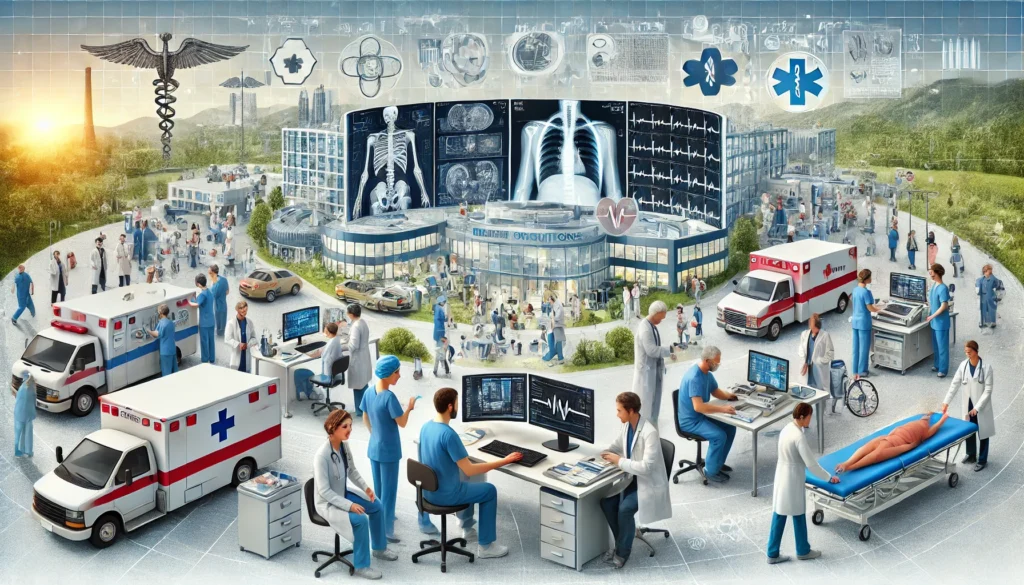The healthcare industry is one of the fastest-growing sectors globally, offering a wide range of career opportunities. Diversified health occupations refer to the many professions within the healthcare field, from direct patient care to administrative and technical roles. Whether you’re interested in becoming a doctor, nurse, therapist, technician, or medical administrator, there is a healthcare career suited to your skills and interests.
This guide will explore the different types of health occupations, required education and skills, job prospects, and how to choose the right career in healthcare.
What Are Diversified Health Occupations?

Diversified health occupations include a broad spectrum of careers within the medical and healthcare industry. These jobs can be categorized into:
✅ Direct Patient Care Careers (Doctors, Nurses, Physical Therapists)
✅ Diagnostic and Laboratory Roles (Radiologic Technicians, Lab Technologists)
✅ Medical Support Staff (Medical Assistants, Nursing Aides)
✅ Healthcare Administration (Health Information Managers, Medical Billers)
✅ Public Health and Research (Epidemiologists, Health Educators)
Each of these fields requires different levels of education, training, and certification.
Types of Diversified Health Occupations
1. Direct Patient Care Careers
These professionals work closely with patients to provide medical care, treatment, and rehabilitation.
Common Careers in Direct Patient Care:
👩⚕️ Physicians and Surgeons – Diagnose and treat illnesses; require medical school and residency training.
👩⚕️ Registered Nurses (RNs) – Provide patient care, administer medications, and educate patients on health management.
👩⚕️ Physical and Occupational Therapists – Help patients recover from injuries and regain mobility.
👩⚕️ Dentists and Dental Hygienists – Specialize in oral health and preventive dental care.
2. Diagnostic and Laboratory Roles
These professionals perform tests and imaging to diagnose medical conditions.
Common Careers in Diagnostic and Laboratory Fields:
🔬 Radiologic Technologists – Use X-rays and imaging equipment to detect diseases and injuries.
🔬 Medical Laboratory Technicians – Analyze blood, tissue, and other samples to diagnose diseases.
🔬 Phlebotomists – Specialize in drawing blood for medical tests and donations.
3. Medical Support Staff
These professionals assist doctors and nurses in providing care and ensuring smooth medical procedures.
Common Medical Support Roles:
🏥 Certified Nursing Assistants (CNAs) – Provide basic patient care like feeding, bathing, and monitoring vital signs.
🏥 Medical Assistants – Help with both clinical and administrative tasks in healthcare settings.
🏥 Emergency Medical Technicians (EMTs) – Provide first aid and emergency care in critical situations.
4. Healthcare Administration and Management
These professionals manage healthcare facilities, medical records, and insurance billing to ensure efficient operations.
Key Careers in Healthcare Administration:
📊 Health Information Managers – Oversee patient records and ensure data privacy compliance.
📊 Medical Billers and Coders – Handle insurance claims and medical billing.
📊 Hospital Administrators – Manage hospital operations, budgets, and staff.
5. Public Health and Research
These professionals focus on disease prevention, community health, and medical research.
Popular Careers in Public Health:
🌎 Epidemiologists – Study the spread of diseases and develop prevention strategies.
🌎 Health Educators – Promote health awareness and create educational programs.
🌎 Biomedical Researchers – Conduct studies to develop new treatments and medical technologies.
Education and Training Requirements
Different healthcare careers require varying levels of education and certification:
📌 Entry-Level Jobs (1-2 Years Training): CNA, Phlebotomist, Medical Assistant
📌 Associate Degree (2 Years): Radiologic Technician, Dental Hygienist, Physical Therapy Assistant
📌 Bachelor’s Degree (4 Years): Registered Nurse, Health Administrator, Medical Lab Technologist
📌 Graduate & Professional Degrees (6-10 Years): Physician, Surgeon, Pharmacist, Epidemiologist
Most healthcare jobs also require certifications and licensing, depending on the country or state regulations.
Also Read: Are Veneers Right for You? Key Considerations Before Choosing Them
Job Outlook and Salary for Diversified Health Occupations
The healthcare industry is experiencing high demand for skilled professionals. The U.S. Bureau of Labor Statistics (BLS) projects that healthcare occupations will grow 13% from 2021 to 2031, much faster than other industries.
💰 Average Salaries of Healthcare Careers:
- Doctors and Surgeons: $200,000+ per year
- Registered Nurses (RNs): $75,000 per year
- Medical Laboratory Technologists: $55,000 per year
- Physical Therapists: $90,000 per year
- Medical Assistants: $35,000 per year
With an aging population and technological advancements, healthcare professionals will continue to be in high demand worldwide.
How to Choose the Right Healthcare Career?
If you’re interested in a career in healthcare, follow these steps:
1️⃣ Assess Your Interests – Do you prefer working directly with patients, behind the scenes, or in research?
2️⃣ Consider Educational Requirements – How many years are you willing to invest in education and training?
3️⃣ Research Job Demand – Look for healthcare jobs with strong growth prospects.
4️⃣ Gain Experience – Volunteer or intern at a hospital or clinic to explore different roles.
5️⃣ Earn Certifications – Depending on your field, you may need a license or certification to practice.
FAQs About Diversified Health Occupations
1. What are the fastest-growing careers in healthcare?
Some of the fastest-growing healthcare jobs include nurse practitioners, physician assistants, home health aides, and medical coders.
2. Do I need a college degree for a career in healthcare?
Not all healthcare jobs require a college degree. Some, like phlebotomists, CNAs, and EMTs, require only certification programs.
3. How can I enter the healthcare industry quickly?
To start quickly, consider short-term training programs such as medical assisting, phlebotomy, or emergency medical technician (EMT) courses.
4. What is the highest-paying job in healthcare?
Surgeons and anesthesiologists earn some of the highest salaries in healthcare, often exceeding $250,000 per year.
5. Can I work in healthcare without patient interaction?
Yes! Careers like medical billing, healthcare administration, and lab research do not require direct patient interaction.
Conclusion
The healthcare industry offers a wide range of career opportunities, from patient care to research and administration. Whether you want to become a doctor, nurse, lab technician, or medical coder, there is a healthcare career that matches your interests and skills. With high demand, job stability, and competitive salaries, diversified health occupations provide a fulfilling and rewarding career path. If you’re passionate about helping others and making a difference in healthcare, now is the perfect time to start your journey!
Related Post
- What Is Medicaid Exclusion For Funeral Plans – Benefits of Medicaid Funeral Exclusions!
- Banner Desert Medical Center – Trusted Care in Arizona!
- Why Cranberry Femine Health – The Ultimate Natural Wellness Guide for Women!
- What Is The Best Peptide For Bone Health – A Comprehensive Overview!
- Why Is Signify Health Calling Me – Understanding the Purpose Behind the Call!

Leave a Reply